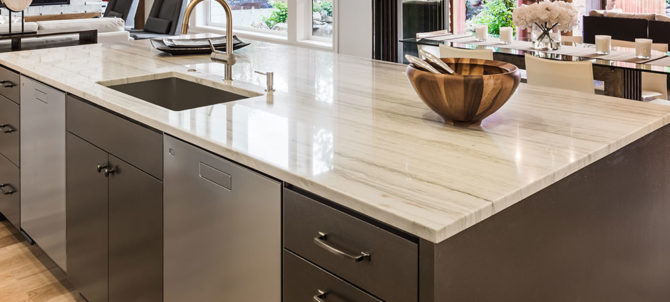
Most people know about granite, marble, and quartz countertops, but there are plenty of other countertop materials you should know about. For example, you should know about Corian countertops.
Corian is the brand name of a solid surface countertop created by DuPont. These countertops are made from a natural mineral blend and acrylic polymer composed of Alumina Trihydrate. Although the countertops mimic the appearance of a stone, they have several distinct properties that make them great countertop choices.
Corian countertops pros and cons
Like other countertops, Corian countertops have their good and bad sides.
Pros
Affordable
Compared to granite, quartz, marble, and other countertops in the market, Corian countertops are much cheaper, making them affordable for most people.
They conduct electricity
This is a unique feature that you won’t find in most countertop materials. While this feature might sound gimmicky to most homeowners, it’s real, and you can work with your technicians and install it on your countertops making it possible to charge your phone wirelessly on the countertops.
While this feature might not be attractive to most homeowners, it comes in handy to those that love cooking while reading recipes on their phones or iPads.
If you are thinking about installing this feature on your countertops, you should note that it will cost you, and you will need to give your countertops special care.
It’s non-porous
Unlike marble and granite, Corian countertops are non-porous, meaning that wine, water, and other liquids won’t easily seep through when you spill on them. This makes the countertops easy to maintain and gives you peace of mind that stains won’t easily come about.
The non-porous nature of the countertops also means that you won’t have to keep sealing the countertops to keep them impermeable to liquids.
Cons
Corian isn’t durable.
Although Corian is affordable, it doesn’t have a long life. This means that when you install it, you will have to replace it several times in your lifetime, and as you can guess, this makes the countertop expensive to have.
One of the reasons the countertop has a short life is because it’s prone to scratches and heat damage, so when you consistently place hot pots on it, it gets damaged, and you have to replace it.
How to maintain Corian countertops
Like other countertops in the market, the key to extending the life of Corian countertops is to take good care of them. How do you do this? Here is how to go about it:
Clean the countertops routinely.
Like other countertops, you have to clean the countertops to keep them looking good. The beauty is you don’t have to be fancy how you go about it. Clean the countertops with dish soap and water to eliminate everyday dirt, grime, and food residues.
Once you are done, dry the countertops with a soft cloth to prevent hard water marks and streaks from forming. The soft cloth also makes the countertops look glossy.
For stubborn dirt, get rid of it using an ammonia-based spray cleaner. When buying the cleaner, pay close attention to the packaging and ensure you aren’t buying a glass or window cleaner. While these have ammonia, they will leave streaks on your countertops, and you don’t want this.
To prevent hard water marks and stains, make it a habit to clean spills as soon as they happen.
Regularly polish the countertops.
Corian countertops come with a semi-gloss, matte, and high gloss finish that you can easily maintain by regularly polishing them. While there isn’t a countertop that will give off the same shiny look you find in granite, you can buff and enhance the look of the countertop with glossy finishes.
All you need to do is spray the polish on the countertops, then buff with a dry, soft cloth.
Protect the countertops from damage
As mentioned above, the reason Corian countertops don’t last as long as granite countertops Raleigh and other countertop materials is because they are easily damaged, so you should protect them from damage.
One way to do it is to protect them from hot pots and pans using oven mitts, trivets, and thick towels. You also should avoid cutting directly on the countertops or sitting on them.